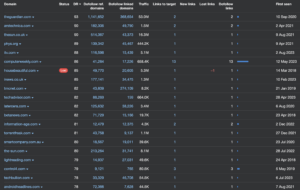Link juice is a term used in the field of search engine optimization (SEO) to describe the value or authority passed from one web page to another through hyperlinks. In other words, it refers to the equity or credibility that a webpage or website can transfer to another webpage or website when it links to it.
When a high-quality and authoritative website links to another website, it is like giving a vote of confidence to that website. This “vote” can significantly impact the search engine rankings and visibility of the receiving site. The more high-quality and relevant websites that link to a webpage, the more link juice it can accumulate, increasing its authority and potential to rank higher in search engine results pages (SERPs).
Link juice can flow both internally, within the pages of a website, and externally, from other websites linking to it. Internal links help search engines understand the structure and hierarchy of a website, while external links from reputable sites signal to search engines that the linked-to website is trustworthy and relevant.
Understanding link juice is crucial for SEO practitioners and website owners, as it plays a vital role in improving a website’s visibility and organic search rankings. By strategically building high-quality links and optimizing internal linking structures, website owners can enhance their website’s link juice and improve their overall search engine performance.
How important link juice is
Link juice plays a significant role in SEO because search engines like Google consider it a key signal of a website’s authority, relevance, and trustworthiness.
When Google’s bot crawls the internet, they follow links from one webpage to another, assessing the quality and quantity of the links they encounter.
These links contribute to the overall link profile of a website and influence its ability to rank well in search results.
Here are some reasons why link juice is important in SEO:
1. Improves search engine rankings
Search engines, like Google, use complex algorithms that analyze various factors to determine how web pages should rank in search results. Link juice is one of the many factors considered when assessing a website’s authority and relevance. Pages with a higher link juice are more likely to rank higher in search results.
2. Increases website visibility
High-quality backlinks from reputable websites can drive referral traffic to a website, increasing its visibility and exposure. When other websites link to a webpage, it increases the chances of attracting new visitors and potential customers.
3. Enhances crawling and indexing
Internal links within a website help search engine spiders navigate and understand its structure. By strategically linking related pages together, website owners can ensure that all their content gets discovered, crawled, and indexed by search engines.
4. Spreads authority
When a high-authority webpage links to another webpage, it passes a portion of its authority to the linked page, boosting its credibility and influencing its search rankings. This helps search engines differentiate between low-quality and high-quality websites.
5. Builds relationships
Link building is not just about improving search rankings; it’s also about building relationships with other webmasters and bloggers. Collaboration and building connections in the digital landscape can lead to valuable opportunities for exposure, guest posting, and shared audiences.
Are all links the same in terms of link juice?
No, not all links carry the same amount of link juice. The authority, relevance, and trustworthiness of the linking page significantly impact the link juice passed.
High-quality links from authoritative websites in the same niche carry more link juice than low-quality links from irrelevant or spammy sources.
It’s important to note that link juice is not the only ranking factor in SEO.
Google considers a wide range of elements when determining rankings, including the relevance and quality of content, user experience, website speed, and mobile-friendliness.
However, link juice remains a significant factor that can greatly influence a website’s SEO performance.
How link juice flows
Understanding how link juice flows is essential for optimizing link building efforts and maximizing the impact of internal and external links.
Here’s a breakdown of how link juice flows within and between pages on your website:
1. Internal linking
Internal linking is the practice of linking one webpage to another webpage within the same domain or website.
It helps search engines understand the relationships between different pages on the site and establishes a hierarchy or structure.
When a webpage receives a link from another page within the same domain, it passes some of its link juice to the linked page.
Here are a few best practices for internal linking:
- Use descriptive anchor text: When creating internal links, utilize anchor text that accurately describes the linked page’s topic. This helps search engines understand the context and relevance of the link.
- Link to relevant pages: Link to pages that are relevant to the context of the content. This not only aids search engines in understanding the content’s structure but also provides visitors with additional resources or information.
- Avoid excessive linking: While internal linking is important, avoid overusing it. Excessive internal links can dilute the link juice passed to each page, making it less impactful.
- Create a logical site structure: Organize your website in a logical structure to ensure that search engines can easily crawl and understand the relationships between different pages.
2. External linking
External linking refers to when a website links to another website or web page outside of its domain. These links can either be natural, where other websites link to your content organically, or acquired through outreach and link building strategies.
When an authoritative website links to another website, it essentially vouches for the linked website’s credibility and relevance.
The linked webpage receives link juice, which positively impacts its search rankings and visibility.
Consider the following guidelines for external linking:
- Seek high-quality and relevant websites: Acquire backlinks from reputable websites that are relevant to your industry or content. Links from authoritative sites carry more weight and can pass a significant amount of link juice.
- Focus on natural link building: Instead of manipulating or buying links, focus on creating valuable and shareable content that other websites and users naturally want to link to.
- Diversify your link profile: Aim for a diverse range of websites and sources linking to your content. Building a diverse backlink profile prevents over-reliance on a single source and enhances the credibility of your website.
- Monitor and disavow low-quality links: Regularly monitor your backlink profile to identify any low-quality or spammy links. Use Google’s Disavow Tool to request that search engines ignore these links and prevent them from negatively impacting your website’s rankings.
Understanding how link juice flows within and between web pages allows website owners and SEO practitioners to develop effective link building strategies, optimize internal linking structures, and focus on acquiring high-quality external links.
How to maximize link juice
While link juice can naturally accumulate through high-quality content and authoritative websites linking to you, there are several strategies you can implement to maximize the flow and impact of link juice.
Consider the following techniques to massively boost the link juice flowing through your website:
1. Create high-quality, linkable content
Producing valuable, unique, and engaging content can increase the chances of other websites linking to your content organically. Invest time and effort into creating content that stands out from the competition and provides value to your target audience.
2. Guest posting and outreach
Engage in guest posting on relevant websites within your industry. By contributing high-quality content to reputable sites, you can generate backlinks and increase your website’s link juice.
3. Social media promotion
Share your content on social media platforms to increase visibility and encourage sharing. When other users link to or promote your content, it can generate additional link juice.
4. Optimize anchor text
Use descriptive and relevant anchor text when linking to other internal or external webpages. Optimized anchor text can positively impact the distribution and flow of link juice.
5. Fix broken links
Regularly perform website audits to identify and fix broken or dead links. Broken links can negatively impact the flow of link juice within your website.
6. Monitor and analyze your backlink profile
Track and analyze your website’s backlink profile using tools like Google Search Console or third-party SEO tools. Identify high-value links and build relationships with webmasters or bloggers who link to your content.
By implementing these strategies, website owners can maximize the flow of link juice, improve their website’s authority, and enhance search engine optimization efforts.
Frequently asked questions
What factors contribute to link juice?
Several factors contribute to link juice, including the authority, relevance, and trustworthiness of the linking webpage, the anchor text used in the link, the quality of the content surrounding the link, and the overall link profile of the website.
Can link juice flow backward?
No, link juice does not flow backward. When a high-authority webpage links to another webpage, it passes link juice in one direction only. However, internal links within a website can distribute link juice to other pages within the same domain.
How can I measure link juice?
Link juice is not a metric that can be precisely measured. However, you can assess the impact of link juice by monitoring your website’s search rankings, organic traffic, and the quality and quantity of inbound links.
Can outbound links from my website affect link juice?
Yes, outbound links from your website can affect link juice. When you link to other websites, you are passing a portion of your website’s link juice to those external pages. Therefore, it’s essential to be selective in linking to relevant and high-quality websites.
Does link juice decay over time?
While link juice can deteriorate over time, it doesn’t instantly disappear. As a webpage gets older and its content becomes outdated, the accumulated link juice may lose some impact. Regularly updating and adding fresh content can help maintain and enhance the link juice.


